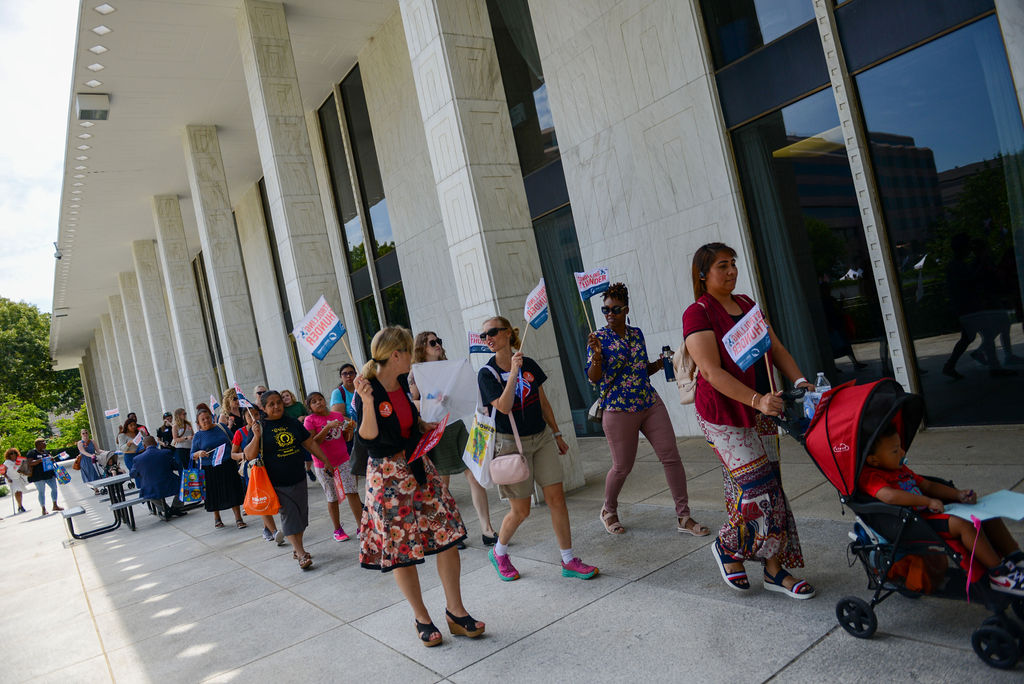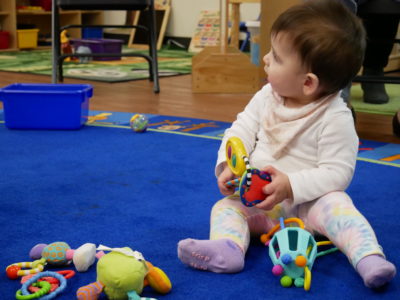

On June 9th, babies, families, and advocates gathered at the General Assembly in Raleigh for the fifth annual Strolling Thunder Advocacy Day to tell state policymakers that when we lift up babies and families, we all can soar. State legislators joined families for a playdate on the lawn to fly kites and hear directly from families and early childhood professionals about issues that impact our state’s youngest children.
While children enjoyed crafts and activities; Rep. David Willis, Rep. Vernetta Alston, and Sen. Natalie Murdock spoke to the crowd about their support for issues like child care and maternal health, and parent advocates gave powerful testimonies about their personal experiences raising babies in North Carolina.
Strolling Thunder is the flagship event of the Think Babies™ NC Alliance. The alliance seeks to ensure that North Carolina’s infants and toddlers benefit from effective and equitable public policies, programs, and funding so that all children have what they need to thrive: healthy beginnings, supported families, and quality early care and learning experiences.
Our cross-sector priorities include expanding Medicaid, improving family economic security, expanding access to paid family leave, and increasing access to affordable, high-quality child care with a well-compensated early childhood workforce.
We know that when we “think babies,” we create stronger families, vibrant and resilient communities, and a prosperous future for North Carolina. The science is clear: our brains grow faster in our first three years than at any later point in our lives. Every second that goes by without investing in our babies is a missed opportunity. The choices our policymakers are making today will determine our children’s opportunities for healthy development and success throughout their lives.
But North Carolina’s leaders are simply not investing enough in what young children need, which means our babies and their families are struggling far more than they should have to. Child care is unavailable and unaffordable, most new parents don’t have access to paid leave, and parents — especially Black mothers — continue to face racist barriers and economic challenges when it comes to taking care of their own health and their baby’s health.
Take it from Katie Cashwell, a mom from Raleigh who spoke at Strolling Thunder:
“I like to use the chicken and egg analogy to describe the search for child care. You need child care to take a job, but you can’t pay for child care until you have a job and have income. Which do you secure first? It’s a maddening situation to be in.
One of the things nobody tells you before you become a parent, is that it is a full-time job to figure out child care for the first five to six years of your child’s life. From filling out applications, interviewing nannies, touring facilities, to conducting background checks and contacting references, it takes an enormous amount of time, energy, and resources to put it all together. There are days when I wonder if families like mine had more support, what else could we individually and collectively be doing with our time? What contributions could we be making to our schools, workplaces, faith communities, and neighborhoods, if we weren’t constantly exhausting so much of our effort on child care arrangements? I’m here today, in part, because I don’t want to leave child care to coincidence and luck. Our children deserve better.”
And Blanca Borceguin, a mom from Durham who spoke about not having access to paid leave:
“When I was 37 weeks pregnant, my supervisor advised me that my company didn’t offer paid maternity leave. That was news to me, and it quickly became a problem. My Ob/Gyn wanted me to come in every two weeks at that point in my pregnancy, and my employer soon warned that I was using up my paid time off by attending those medical appointments.
Pregnancy is one of the most exciting and also one of the most scary times in a woman’s life. Not having access to paid leave makes you completely vulnerable, scared, and helpless. Nobody should go through that. Nobody should be made to feel guilty for pumping at work. Nobody should have to choose between her job and caring for a newborn, or between her job and getting the health care she needs.”
And Tina Sherman, a mom from Apex and a senior campaign director with MomsRising, who spoke about our state’s maternal health crisis:
“I have four children from three births. With each birth, my needs, preferences, and choices were ignored. With each birth, I was pressured, even bullied, by providers. With each birth, my experience was far from optimal — much more traumatic than it needed to be.
Maternal health truly is a public health emergency, and COVID has only escalated the already alarming situation. This issue is very personal to me. I’m a mom who has personally experienced the shortcomings in our maternal health care system, a doula who works to support and protect other moms, and an advocate fighting to improve maternal health.”
These parents and advocates raised their voices because they know that North Carolina’s babies and families deserve better. As the crowd chanted and pleaded while “strolling” around the legislative building, “Think of our babies!”
As a state, we cannot continue to ignore the needs of our youngest children. It’s time for policymakers at all levels to make the potential of every baby their top priority. Our state has billions of dollars in surplus right now. There is nothing more urgent than to direct those dollars to making sure that every child — regardless of race, family income, or zip code — has the opportunity to grow, learn, and succeed.
It’s time to be a big voice for babies. Please join us in urging our state leaders to “think babies” and invest in our youngest and most valuable resource. North Carolina’s babies are counting on all of us.




